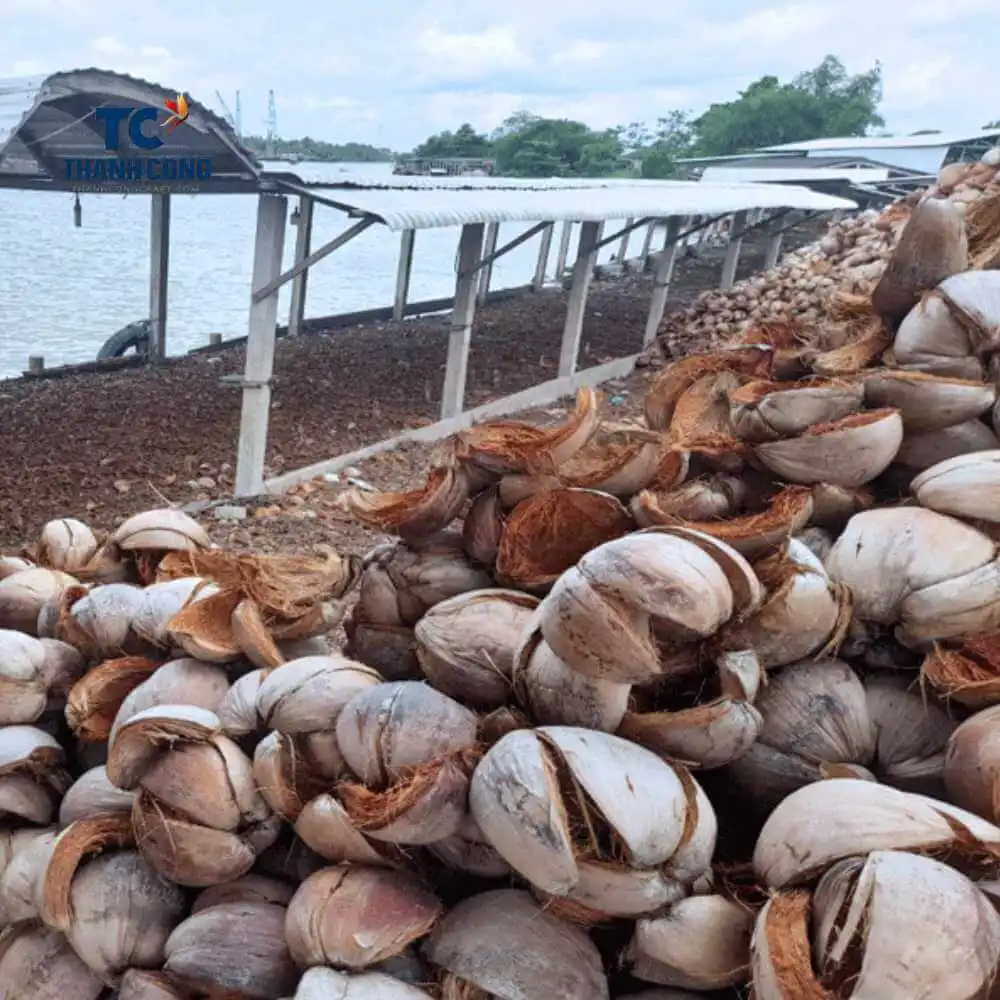Kết quả 1 đến 1 của 1
-
07-21-2023, 03:10 PM #1
 Silver member
Silver member
- Ngày tham gia
- Jul 2023
- Bài viết
- 129
Uses of Coconut Husk and Coconut Fibre
Coconut husk
A coconut husk refers to the outer protective layer of a coconut (aka coconut covering), which is a large seed of the coconut palm (Cocos nucifera). The coconut husk is the fibrous and coarse material that encases the coconut fruit. It is also commonly known as the "coir," and it serves as a natural protective barrier for the inner seed.

The coconut husk is made up of two main components:
Coir fiber: The coir fiber is the tough, fibrous material that makes up the bulk of the coconut husk. These fibers are long, strong, and resistant to saltwater, making them suitable for various practical applications.
Coir dust (coir pith): The coir dust, also known as coir pith or coir peat, is a powdery substance found between the coir fibers and the hard inner shell of the coconut. It has excellent water retention properties and is commonly used as a growing medium in horticulture and gardening.
When a coconut ripens and matures, the husk surrounding the seed gradually turns brown and hardens. To extract the coir fiber and coir dust, the coconut husk is processed through various methods, including soaking, beating, and drying. Once processed, the coir fiber and coir dust are used in a wide range of applications, as mentioned in the previous answer.
Use of coconut husk
Coconut husks have various practical and useful applications due to their unique properties and natural composition.
Here are some common use of coconut husk:- Coconut coir: The fibrous material found in coconut husks is known as coconut coir. It is widely used in horticulture and gardening as a growing medium. Coir has excellent water retention properties, making it an ideal alternative to peat moss in potting mixes. It provides good aeration and helps promote healthy root growth in plants.
- Coco peat: Coco peat, also known as coir pith or coir dust, is a byproduct obtained from processing coconut husks. It is used as a soil conditioner and a component in potting mixes. Coco peat improves soil structure, enhances water retention, and aids in nutrient absorption by plants.
- Coir ropes and mats: The strong and durable fibers of coconut husks are used to make coir ropes and mats. These ropes are commonly used in various industries, including agriculture, construction, and marine applications. Coir mats are used as doormats and in erosion control to prevent soil erosion on slopes.
- Brushes and brooms: The tough fibers of coconut husks make them suitable for creating brushes and brooms. These natural brushes are used for cleaning various surfaces, including floors, carpets, and even cars.
- Pot liners: In gardening, coconut husks are sometimes used as pot liners. They act as a barrier between the potting soil and the container, preventing soil loss while maintaining adequate drainage.
- Bedding for animals: Shredded coconut husks can be used as bedding for animals, especially reptiles and small pets like hamsters. The coir provides a natural and safe substrate for these animals.
- Charcoal production: Coconut husks are a valuable source of charcoal. The process of converting coconut husks into charcoal involves carbonizing the material in a low-oxygen environment. Coconut charcoal is commonly used in cooking and as an ingredient in activated carbon filters.
- Handicrafts and decorations: The natural texture and appearance of coconut husks make them ideal for crafting decorative items such as bowls, coasters, and sculptures.
- Fuel and energy source: In some regions, coconut husks are used as a biomass fuel for cooking and heating purposes. They can be burned directly or processed into briquettes for more efficient use.
- Absorbent material: Coir fibers have excellent absorbent properties, making them suitable for cleaning up oil spills and other environmental hazards.
Overall, coconut husks offer a sustainable and versatile resource with applications in various industries, benefiting both the environment and human needs.
Use of coconut fibre
Coconut fiber, also known as coir fiber, is extracted from the outer husk of coconuts and has numerous applications due to its strong and durable nature.
Here are some common use of coconut fibre:- Rope and twine production: Coconut fiber is twisted and spun into ropes and twine, known as coir ropes. These ropes have high tensile strength and are used in various industries, including agriculture, construction, and marine sectors.
- Matting and floor covering: Coir mats and carpets are made from coconut fiber. These natural and biodegradable mats are popular for their durability and ability to withstand wear and tear. They are commonly used in entryways, doormats, and floor coverings.
- Erosion control and landscaping: Coir erosion control blankets and logs are used to prevent soil erosion in slopes and embankments. The fibers create a natural barrier that helps stabilize the soil and promote vegetation growth.
- Horticulture and gardening: Coconut fiber is used as a growing medium, similar to coconut coir. It is an essential component in hydroponic systems and can also be mixed with soil to improve water retention and aeration for plants.
- Potting soil amendment: Coconut fiber, in its shredded form known as coir peat or coir dust, is used to improve the texture and moisture retention of potting soil. It serves as an eco-friendly alternative to peat moss.
- Animal bedding and nesting material: Coconut fiber is sometimes used as bedding for animals, including reptiles, birds, and small mammals. It provides a natural and comfortable substrate for these animals to rest and nest.
- Upholstery and cushioning: Coconut fiber can be used as an eco-friendly filling material for cushions and upholstery. When combined with natural latex or other materials, it creates comfortable and sustainable seating options.
- Handicrafts and decorations: Coconut fiber can be woven and crafted into various decorative items, such as baskets, wall hangings, and sculptures. Its natural texture and appearance add an aesthetic appeal to these creations.
- Filtration media: Coconut fiber is utilized as an ingredient in making filtration media, especially for water and air purification applications. It acts as a natural filter, removing impurities and contaminants.
- Biodegradable pots and planters: Coir pots are made from coconut fiber and are an eco-friendly alternative to traditional plastic pots. They can be directly planted in the ground, and as they degrade, they provide nutrients to the plants.
Coconut fiber's versatility, biodegradability, and sustainability make it a valuable material in various industries and contribute to environmental conservation efforts.View more random threads:
- Có nên dùng két sắt vân tay Việt Tiệp Hiện giờ không?
- Bộ Ghế Sofa Cao Cấp Giá Siêu Rẻ - Nice Day
- cách chọn bình tắm nóng lạnh khi sử dụng ở nhà
- Cách lựa chọn gạch bông đạt hiệu quả thẩm mỹ cao
- Loại bỏ keo ra khỏi sàn gỗ tự nhiên
- Các loại gỗ nhựa được phát triển từ nguyên liệu nhựa và bột gỗ
- Những lời khuyên chọn rèm cửa phong cách
- Tác dụng của tủ giày để tại nhà và những điều cần lưu ý
- Gợi ý quà tặng cuối năm cho doanh nghiệp ý nghĩa
- Tiêu chí mua thảm lót sàn văn phòng giá rẻ mà phù hợp



 Trả lời kèm Trích dẫn
Trả lời kèm Trích dẫn





Thảo luận Vòng tay ngọc bích xanh...
Hôm qua, 07:28 PM in Rao vặt tổng hợp